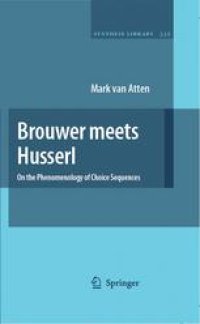
Ebook: Brouwer Meets Husserl: On the Phenomenology of Choice Sequences
Author: Mark van Atten (auth.)
- Tags: Phenomenology, Mathematical Logic and Foundations, Ontology, Metaphysics
- Series: Synthese Library 335
- Year: 2007
- Publisher: Springer Netherlands
- Edition: 1
- Language: English
- pdf
Can the straight line be analysed mathematically such that it does not fall apart into a set of discrete points, as is usually done but through which its fundamental continuity is lost? And are there objects of pure mathematics that can change through time?
The mathematician and philosopher L.E.J. Brouwer argued that the two questions are closely related and that the answer to both is "yes''. To this end he introduced a new kind of object into mathematics, the choice sequence. But other mathematicians and philosophers have been voicing objections to choice sequences from the start.
This book aims to provide a sound philosophical basis for Brouwer's choice sequences by subjecting them to a phenomenological critique in the style of the later Husserl.
"It is almost as if one could hear the two rebels arguing their case in a European café or on a terrace, and coming to a common understanding, with both men taking their hat off to the other, in admiration and gratitude. Dr. van Atten has convincingly applied Husserl's method to Brouwer's program, and has equally convincingly applied Brouwer's intuition to Husserl's program. Both programs have come out the better." Piet Hut, professor of Interdisciplinary Studies, Institute for Advanced Study, Princeton, U.S.A.
The theory presented here represents a radical departure from current treatments of the theory of knowledge. It makes the point that all such work is based on the false assumption that what makes knowledge possible is in itself knowable in some way, whereas in fact it is below the threshold of any cognitive consciousness. It is therefore necessary to seek the basis of the possibility of knowledge on entirely different levels, and in entirely novel ways. To Know or Not to Know is the first presentation of the theory in full, earlier writings being only preliminary and brief. It is aimed at the general philosopher, and the specialist in the field of epistemology, but relevant to anyone who would understand how it is possible to know anything at all.